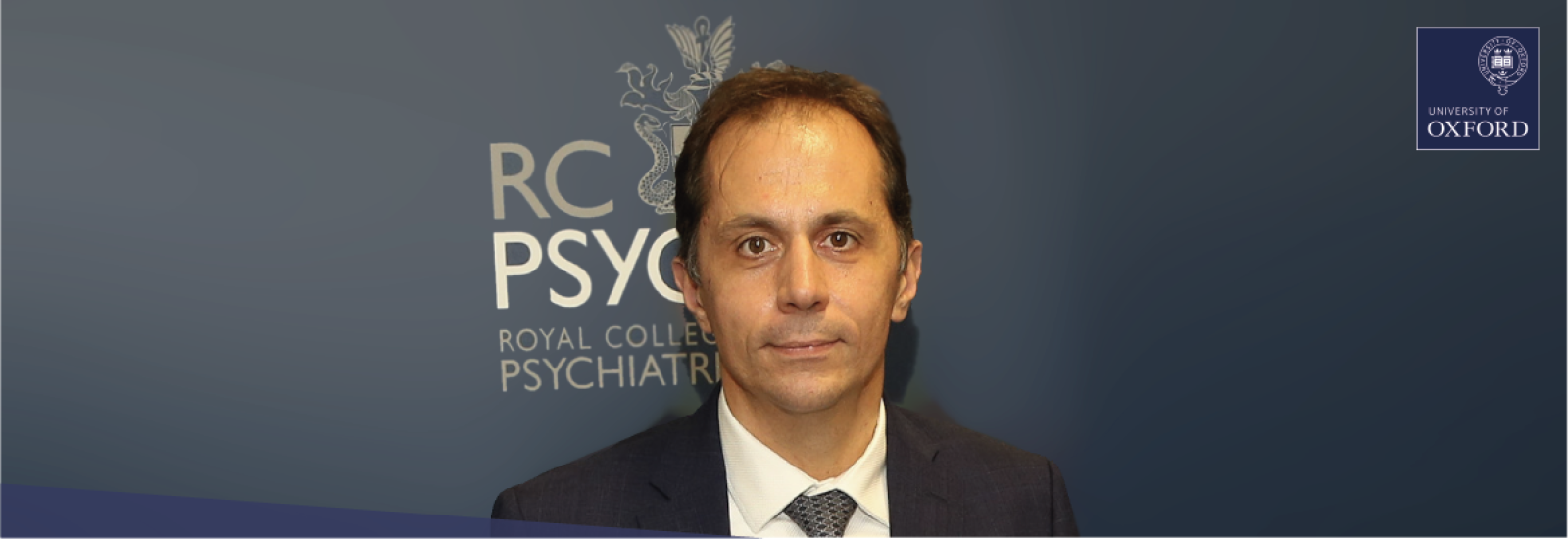
Professor Andrea Cipriani and the search for a revolution in mental health treatments - and an organ to play
It may not be quite time to throw out the psychiatrist’s couch, but Oxford professor of psychiatry Andrea Cipriani is hoping his research might transform the traditional approach to mental health treatment.
Working with his multidisciplinary team at the Oxford Precision Psychiatry Lab, the Italian-born professor is conducting evidence-based research into treatment for depression; if successful, this research could transform the way people with mental health conditions are treated by medical practitioners in the NHS.
Rather than embarking on long trial-and-error course, Professor Cipriani’s research looks to introduce a more rigorous, reliable approach to find the right treatment for each individual, using a shared decision-making process, which takes into account patients’ personal preferences and values.
If successful, this research could transform the way people with mental health conditions are treated by medical practitioners in the NHS. Rather than embarking on long trial-and-error course, Professor Cipriani’s research looks to introduce a more rigorous, reliable approach
The research will encompass information from 40,000 cases of depression from hundreds of randomised trials, as well as real world data about treatment impact on 700,000 NHS patients. The aim is to identify patterns within individual treatment journeys - such as what has been proven to work or has been better tolerated for people with specific characteristics. In a field where – 'unfairly' – commonly prescribed medications are believed not to be substantially different, this personalised approach will help clinicians and patients decide together which treatment suits them best, when they agree to start an antidepressant. Results from this research can save time and suffering for the patients, and also money and resources for the NHS, improving outcomes for all parties.
‘The idea is to combine different types of data in a digital, web-based algorithm (ie a shared decision-making tool), that can tailor treatment to individuals suffering with depression in real-world clinical setting,’ says Professor Cipriani. His expertise in precision psychiatry started from his frustration as a clinician, finding the available clinical tools for treatment of mental health conditions are not geared up for taking into account individuality. Clinicians tend to prescribe treatments relying on their personal experience or using mean effects of interventions.
‘We treat individuals, not averages,' Professor Cipriani continues. 'Cutting-edge evidence-based research is needed, to allow precision within treatment. By synthesising existing data at the individual patient level, we can identify personal characteristics and predict the effects of treatment on specific individuals; innovative technology will help us identify the best treatments early, rather than wasting time trying multiple, ultimately unsuccessful medical strategies.’
Cutting-edge evidence-based research is needed, to allow precision within treatment...and predict the effects of treatment on specific individuals...[to] identify the best treatments early, rather than wasting time trying multiple, ultimately unsuccessful medical strategies
Professor Andrea Cipriani
The web-based tool is currently being tested in a randomised controlled trial (called PETRUSHKA), which opened in December 2022 and is recruiting patients across the UK (and likely to expand internationally).
'In GP surgeries, clinicians are able to input patients’ characteristics (ie age, gender, severity of symptoms) and preferences (which side effects they are most bothered about) and the algorithm will produce the top three treatment options for each individual. Doctors can then discuss these options with the patient, who can, in turn, make an informed decision.'
The PETRUSHKA tool has been developed in close collaboration with patients and carers. It currently explores anti-depressant treatment of depression, but there is also scope for applying the results of this research to other type of interventions (such as talking therapies) and other mental health conditions.
A passionate advocate for the evidence-based approach, Professor Cipriani maintains that, if the trial is successful, there is prospect for those suffering from depression being offered a tailored treatment, just as in other field of medicine. This will not just reduce time spent trying out wrong drugs. It will also help to reduce the stigma towards mental health, by offering patients a more tailored treatment, similar to what you would expect with other health conditions.
Clinicians are able to input patients’ characteristics (ie age, gender, severity of symptoms) and preferences...and the algorithm will produce the top three treatment options for each individual. Doctors can then discuss these options with the patient, who can, in turn, make an informed decision
Listening to Professor Cipriani talk in his tiny office, it all sounds so simple, but so potentially revolutionary. His enthusiasm and commitment are highly persuasive and infectious. But he insists, 'It is important to know that there are many people, especially online, offering technology-driven and overly simplified answers to mental health issues. People must be aware of these clearly false promises. All interventions or medical devices have to be properly tested and their findings should be replicated using a scientifically sound approach.'
Professor Cipriani says, ‘We hope to have the trial finished by summer 2024 and we will be able to put our results in the public domain as soon as they are available - but it is early days at the moment. We have randomised 10 patients so far, we need to reach 500 and we don’t know yet if PETRUSHKA works; however, if so, it can really be transformational for clinical practice, a real step forward, a material change in the treatment of mental health conditions.'
 Professor Cipriani
Professor Cipriani Professor Cipriani has made his home in Oxford for nearly a decade, despite confessing to falling into the Italian stereotypes, and missing the Italian weather, the food and the wider family. Professor Cipriani, his wife and their children first came to Oxford in 2002, when he was a resident in Psychiatry at the university of Verona, and his wife had a visiting post here. It was then that he first met Professor John Geddes, his ‘maestro’. He says, 'He was a truly enriching person, who introduced me to evidence-based mental health and inspired me to become a clinical academic.’
After that year in the UK, the family returned to Verona, where the young psychiatrist took up a position at the university. He says, ‘It was very challenging; Italian universities are extremely hierarchical.'
In 2013, Andrea came back to Oxford for a fixed term position at the university first, and, five years later, a professorship.
While his wife, a neurologist, embraced a joint clinical and academic position locally, their two children, went through secondary school in Oxford, and are now studying at UK universities. Andrea gratefully admits, 'The environment here is supportive. I am not sure we could have done this anywhere else.'
Despite the Professor’s successful career within psychiatry, his first passion was actually music...After his medical degree in Padua and a diploma in organ at the Conservatorio Santa Cecilia in Rome, he went to study Orgel Konzertfach in Vienna, with the view of becoming a concert organist
Despite the Professor’s successful career within psychiatry, his first passion was actually music. While qualifying as a medical doctor in Italy, he developed his passion for playing and writing music. After his medical degree in Padua and a diploma in organ at the Conservatorio Santa Cecilia in Rome, he went to study Orgel Konzertfach in Vienna, with the view of becoming a concert organist. Studying among many notable musicians in the city of Mozart, he qualified and took his place among leading professionals. After concluding his studies, he embarked on a range of professional recitals, playing in many cities around Europe. Additionally, he has two CDs to his name (one is a complete recording of the Goldberg Variations on the harpsichord). In the eyes of most aspiring musicians, this would be ‘living the dream’. But, describes himself with an ironic smile as a ‘failed musician’, and says, ‘The organ is quite niche.’
 Professor Cipriani at the organ
Professor Cipriani at the organAfter concluding his studies, he embarked on a range of professional recitals, playing in many cities around Europe....he has two CDs to his name...In the eyes of most aspiring musicians, this would be ‘living the dream’. But, Professor Cipriani describes himself with an ironic smile as a ‘failed musician’, and says, ‘The organ is quite niche.’
However, his love for music is undimmed. Being extremely well qualified as a Viennese-educated organist, Professor Cipriani has hopes of one day being able to get out his organ shoes and play in a college chapel or Oxford church, ‘I have hoped to be able to do this...but no one has come knocking so far.’
But then no one knows there is a concert organist working as a professor at the Department of Psychiatry.
As with his pursuit of musical excellence, randomised trials are the opposite of an easy route. Professor Cipriani’s dedication to precision in psychiatry is, perhaps, a hangover from his studies of the organ; it is often seen as the most difficult instrument, requiring not just two hands to play proficiently on multiple keyboards, but also two feet on the pedals. And most importantly, organ music is an example of ‘tailored’ music. The organ repertoire is largely written for a particular instrument: Italian organs are different from German ones, and an organ built in France in 1600 is completely different from a French instrument of the XIX century.
Professor Cipriani has hopes of one day being able to get out his organ shoes and play in a college chapel or Oxford church, ‘I have hoped to be able to do this...but no one has come knocking so far.’
'You cannot play any organ piece in any instrument, there is one specific music for each organ,' insists Professor Cipriani. 'Just as in medicine, and psychiatry should be no less. There is great need to introduce a personalised approach to diagnose and treat mental health conditions.'
By Sarah Whitebloom